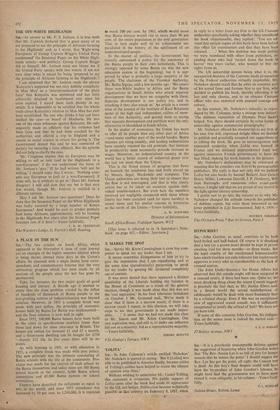`LOLITA'
SIR,—In John Coleman's article entitled 'Nabokov' Mr. Nabokov is quoted as saying: 'But it [Lolita] was able to be published in America finally, because critics of Trilling's calibre have helped to create the climate of opinion over, there.'
Without wishing to undermine Mr. Lionel Trilling, this statement is erroneous. His public support of Lolita came after the book had made its appearance in the US, not before. Publication became technically possible in that country on February 8, 1957, -when, in reply to a letter from my firm to the US Custo authorities specifically asking whether they consider the book objectionable, they replied : 'You are ad vised that certain copies of this book have been befo this office for examination and that they have be released. . . .' When this decision was made publi we were inundated with offers from publishers, in eluding those who had 'turned down the book horror' two years earlier, who wanted to buy th rights from us.
Thc US censorship system being what it is, th unexpected decision of the Customs made prosecutio by the Federal authorities virtually impossible. M Nabokov should recall that he owes an essential pa of his actual fame and fortune first to my firm, wh decided to publish his book, thereby affording it i last and only chance, and to an obscure Custo officer who was endowed with unusual courage an culture.
In this context, Mr. Nabokov's remarks, as repr duced by Mr. Coleman, strike a strange note indeed 'The dubious reputation of Olympia Press hadn' helped. Yes, there should certainly be some forms o censorship against commercial pornography.'
Mr. Nabokov offered his manuscript to my firm o
his own free will, expressed delight when we decide to publish and gratefully accepted our suggestions to editing the book. He gave us encouragement an4 expressed sympathy when Lolita was banned itt France and we initiated unprecedented legal against successive French governments to have the ban lifted, making his book famous in the process.
Mr. Nabokov's declarations may be construed as
meaning that he considers our firm to be pornographic publishers. My reply is that not only did we publish Lolita but also books by Samuel Beckett, Jean Genet:. Henry Miller, Lawrence Durrell, J. P. Donleavy, Wil liam Burroughs and numerous other avant-garde writers. I might add that we are proud of our record in the fight against literary censorship.
I prefer not to go into the reasons as to why Mr.
Nabokov changed his attitude towards his publisher of dubious repute, but refer those interested to my letter published in Life International, July 6, 1959.— Yours faithfully,
MAURICE GIROD1A9
The Olympia Press, 7 Rue St-Severin, Paris 5










































 Previous page
Previous page